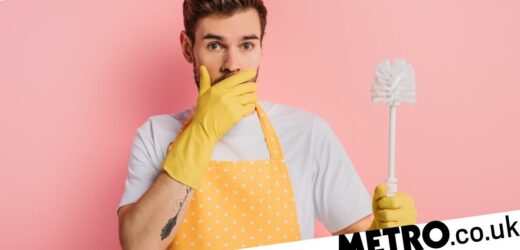Replacing your toilet brush is likely not very high on your to-do list.
Try to think back to when you last did so, however, and you may want to make it a priority.
Interiors experts say it’s important to change your toilet brush at least every nine months to prevent the spread of germs.
So next time you give the lavvy a scrub, consider the bacteria lurking on your tool of choice.
Nic Shacklock from Online Bedrooms explains: ‘We don’t realise how often things in our home may need replacing from a hygiene point of view. If things look clean, we simply leave it be.
‘However, there’s a real danger of not replacing some of these items such as the toilet brush, as the germs that linger can cause a wide range of health problems.’
A dirty toilet brush won’t do its job cleaning your loo for one thing, and can even make you ill. According to Elizabeth Scott, co-director of Simmons Center for Hygiene and Health in Home and Community, if anyone in your household has a gastrointestinal illness, the brush becomes ‘infectious material’ and should be binned.
Expert plumber Gary Johnson also adds: ‘Please keep in mind that it not only has bacteria from the toilet water, but also it can trap faecal matter or toilet paper, which is unsanitary and unhealthy.’
Guidance recommends throwing away plastic loo brushes that are discoloured, have bent bristles, or smell even after cleaning. Additionally, you should disinfect the brush-head after each use or once a week at a minimum.
This is something that’s clearly being overlooked. In a poll by Consumer Reports, over 77% of respondents admitted to never having cleaned theirs – and some claimed to be unaware it was necessary.
Thankfully it’s not too difficult. Soak the brush in a bucket filled with boiling water and a couple of capfuls of bleach for an hour, spray the holder with disinfectant spray, then pop everything back where it belongs once it’s dry.
Silicone brushes tend to need replacing less often than traditional plastic options as they trap fewer germs, and you can assuage any eco-concerns by only replacing the head or going for a plastic-free alternative.
Some aren’t convinced they’re worth having at all. Cleaning expert Aggie MacKenzie told The Guardian she avoids toilet brushes altogether, saying they give her the ‘heebie-jeebies.’
‘I can’t bear them. I just think they are vile,’ commented the How Clean Is Your House star, adding: ‘There is a fetid liquid bacteria soup at the bottom of every toilet-brush holder.’
Instead she recommends donning a pair of rubber gloves and using a fingernail to get under the rim, although we can’t see the hands-on approach being adopted too widely.
Do you have a story to share?
Get in touch by emailing [email protected].
Source: Read Full Article




